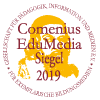Pedagogical concept
Text
Explains the basic educational concept of Experimento | 4+, then offers tips for working with children on experiments.
Type of media:
Text (99.4 kByte)
Last update:
2019-04-05
License:

This medium is made available under a CC BY-SA 4.0 international license.
What does this mean?
How to reference this medium

This medium is made available under a CC BY-SA 4.0 international license.
What does this mean?
How to reference this medium
Media package:
Experimento | 4+: A game teaching current consumption
Experimento | 4+: A walk to look for garbage
Experimento | 4+: Batteries and their disposal
Experimento | 4+: Batteries and their use
Experimento | 4+: Colored tops
Experimento | 4+: Conductors and non-conductors (insulators)
Experimento | 4+: Distinguishing and recognizing odors
Experimento | 4+: Electrical appliances and their use
Experimento | 4+: Evaporation and vaporization
Experimento | 4+: Feeding animals
Experimento | 4+: Feeling air
Experimento | 4+: Feeling memory game
Experimento | 4+: Gastrointestinal tract
Experimento | 4+: Making air visible
Experimento | 4+: Making dirt in the air visible
Experimento | 4+: Making dirt in water visible
Experimento | 4+: Natural forces
Experimento | 4+: Our bones
Experimento | 4+: Our hand
Experimento | 4+: Our mouth
Experimento | 4+: Our organs
Experimento | 4+: Parallel circuits
Experimento | 4+: Pulse and breathing
Experimento | 4+: Purifying water by means of a filter
Experimento | 4+: Role-play to demonstrate electron flow
Experimento | 4+: Scab formation
Experimento | 4+: Series circuits
Experimento | 4+: Simple circuit
Experimento | 4+: Skin as a sensory organ
Experimento | 4+: Switches
Experimento | 4+: Taste Bar (flavor test)
Experimento | 4+: Various loads in a circuit
Experimento | 4+: Waste separation and avoidance
Experimento | 4+: Water cycle hand and finger game
Experimento | 4+: Water hodgepodge
Experimento | 4+: When plants drink
Experimento | 4+: Xylophone made from different materials
Experimento | 4+: A walk to look for garbage
Experimento | 4+: Batteries and their disposal
Experimento | 4+: Batteries and their use
Experimento | 4+: Colored tops
Experimento | 4+: Conductors and non-conductors (insulators)
Experimento | 4+: Distinguishing and recognizing odors
Experimento | 4+: Electrical appliances and their use
Experimento | 4+: Evaporation and vaporization
Experimento | 4+: Feeding animals
Experimento | 4+: Feeling air
Experimento | 4+: Feeling memory game
Experimento | 4+: Gastrointestinal tract
Experimento | 4+: Making air visible
Experimento | 4+: Making dirt in the air visible
Experimento | 4+: Making dirt in water visible
Experimento | 4+: Natural forces
Experimento | 4+: Our bones
Experimento | 4+: Our hand
Experimento | 4+: Our mouth
Experimento | 4+: Our organs
Experimento | 4+: Parallel circuits
Experimento | 4+: Pulse and breathing
Experimento | 4+: Purifying water by means of a filter
Experimento | 4+: Role-play to demonstrate electron flow
Experimento | 4+: Scab formation
Experimento | 4+: Series circuits
Experimento | 4+: Simple circuit
Experimento | 4+: Skin as a sensory organ
Experimento | 4+: Switches
Experimento | 4+: Taste Bar (flavor test)
Experimento | 4+: Various loads in a circuit
Experimento | 4+: Waste separation and avoidance
Experimento | 4+: Water cycle hand and finger game
Experimento | 4+: Water hodgepodge
Experimento | 4+: When plants drink
Experimento | 4+: Xylophone made from different materials
Description:
The experimentation process should be designed as a co-construction, with children and educational experts working side by side. Children form their own picture of the world with the support and collaboration of their peers. The idea behind metacognition is that children become aware of the learning process. This can be achieved through reflection, additional activities, and links to other areas of education. During the experimentation phase, it is important to build upon what the children already know and engage them in a dialog so that ultimately, they will learn to think independently.
Related media:
There are no other media directly related to this file.
Learning resource type:
Teaching methods
Subjects:
Personal, social and health education (PSHE)
Grade levels:
Grade 1 to 4
School types:
Elementary school; Preschool
Keywords:
Energy; Environmental education; Health
Bibliography:
Siemens Stiftung Media Portal
Author:
Stiftung Haus der kleinen Forscher
Rights holder:
© Siemens Stiftung 2016


